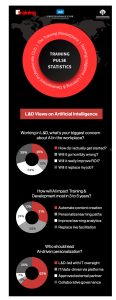With artificial intelligence (AI) continuing to dominate the headlines—and Learning and Development (L&D) conversations—we focused three out of four of our polls this month on the topic. We wanted to find out L&D’s biggest concern about AI, how it will affect training in the coming years, and who should lead AI-driven personalization.
KEEPING L&D AWAKE AT NIGHT
The most common concern for more than one-third (34%) of 428 respondents is a practical one: Will AI deliver a measurable return on investment? This reflects a healthy skepticism from L&D professionals who have seen hype cycles come and go. Many want proof, not promises.
Almost a third of respondents (29%) worry about job security, showing how AI’s potential for automation is as much a human issue as a technological one. And a quarter of respondents simply feel overwhelmed about where to begin, echoing the sentiment that “AI readiness” is not yet evenly distributed across organizations.
While garnering the smallest number of responses at 12%, the worry that things will go horribly wrong with AI still represents more than 50 people voicing fears of unintended consequences—from flawed outputs to ethical pitfalls.
These themes link closely to the “Human-Centered Leadership in the Age of AI-Driven Transformation” Webinar (https://www.trainingmagnetwork.com/events/4215), which takes a practical look at how leaders can guide teams through these exact concerns without losing sight of people-first principles.
LOOKING AHEAD AT AI IN TRAINING
When we asked how AI will impact training and development most in the next 3 to 5 years, the leading answer was “personalize learning paths” (35% of 516 respondents), followed closely by “automate content creation” (31%).
Interestingly, only 10% believe AI will replace live facilitation—a reminder that the human element is far from obsolete. This aligns with the Webinar, “Communicate with Emotional Intelligence” (https://www.trainingmagnetwork.com/events/4175), which underlines why human connection remains central even in a tech-driven future.
In keeping with that theme, we found that the vast majority of 1,631 respondents believe emotional Intelligence is the hardest soft skill to master (64%). It came in far ahead of resilience (16%), communication (13.6%), and adaptability (6.4%).
LEADING AI-DRIVEN PERSONALIZATION
Respondents revealed a strong preference for L&D to lead AI-driven personalization with IT oversight (63% of 250 voters), followed by collaborative governance at 25%.
The very low percentages for IT/data-driven personalization via platforms (5%) and approved external partners (7%) suggest that while technology is the enabler, ownership of AI in learning is firmly expected to stay inside the organization.
“AI’s biggest impact in the next 3 to 5 years will be to “personalize learning paths,” believe one-third of respondents. Only 10% think AI will replace live facilitation—a reminder that the human element is far from obsolete.”
TAKEAWAYS
Across all four polls, two things are clear:
- L&D professionals want AI to be practical, ethical, and driven by results.
- Human skills—such as emotional intelligence, adaptability, and communication—remain just as vital as any technological leap.


